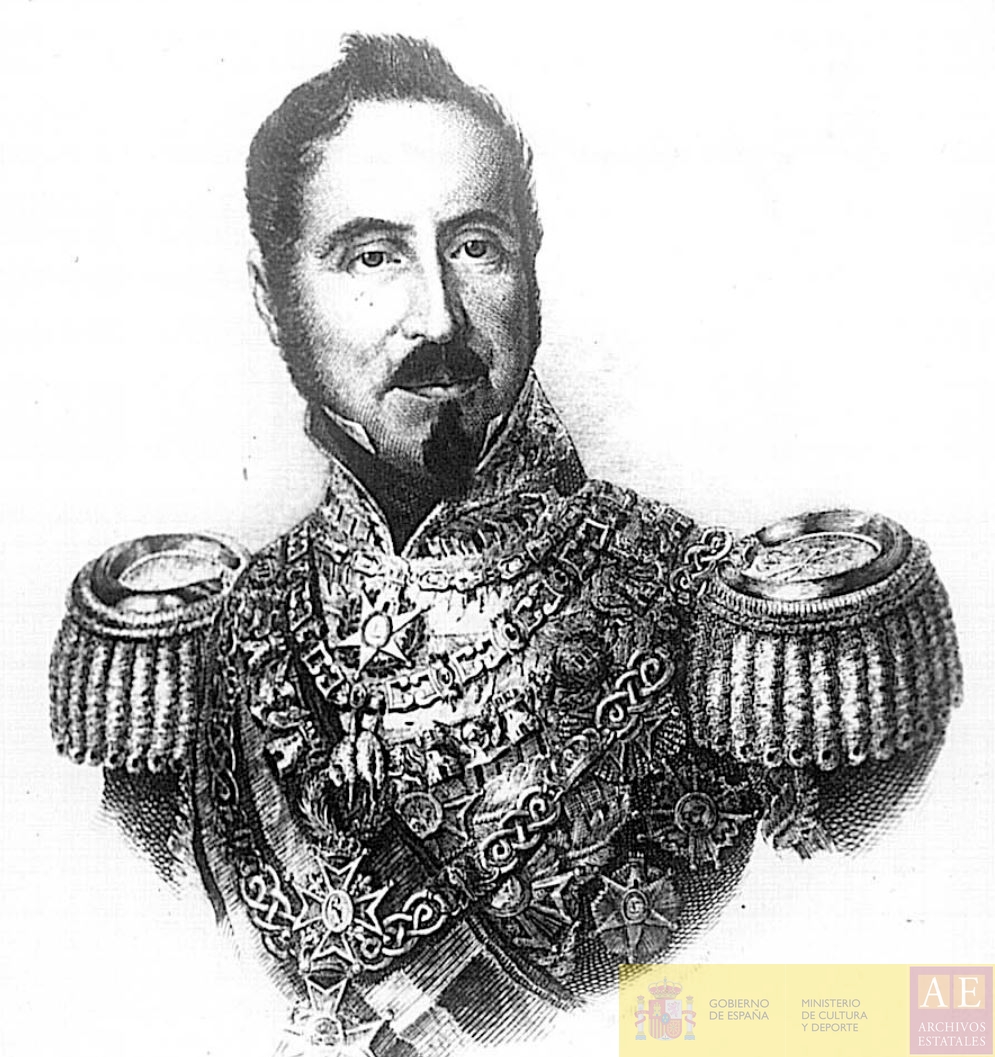 Persona - Espartero, Baldomero (1793-1879)
Persona - Espartero, Baldomero (1793-1879)
Identificación
Tipo:
Persona
Forma autorizada:
Espartero, Baldomero (1793-1879)Otras formas
Fechas de existencia:
Granátula de Calatrava (Ciudad Real, España) 1793-02-27 - Logroño (La Rioja, España) 1879-01-08
Historia:
Joaquín Baldomero Fernández-Espartero y Álvarez de Toro (Granátula de Calatrava, 27 de febrero de 1793-Logroño, 8 de enero de 1879). Militar y político español. I duque de la Victoria, I conde de Luchana y Príncipe de Vergara. Fue Ministro, Regente del Reino y Presidente del Consejo de Ministros.
Principales cargos: Regente: 17 de octubre de 1840-23 de julio de 1843. Ministro de Guerra 29/07/1837 a 18/08/1837; 18/08/1837 a 30/08/1837; 16/12/1837 a 17/01/1838. Presidente del Consejo de Ministros 18/08/1837 a 18/10/1837; 16/09/1840 a 10/05/1841; 19/07/1854 a 28/11/1854; 28/11/1854 a 14/07/1856.
De familia humilde, hijo de un artesano de carruajes. Cursó sus primeros estudios en el seminario de Almagra, en 1808 se incorporó al cuerpo de estudiantes, creado para combatir a los franceses, y en 1811 alcanzó el grado de teniente de ingenieros. En 1814, pasó al arma de infantería y quedó de guarnición en Valladolid hasta que en 1815, ya con el grado de capitán fue destinado a la expedición del general Morillo América. Intervino en Venezuela y Panamá, allí consigue el grado de brigadier y tras la derrota de Ayacucho, en 1824 queda prisionero en manos de Bolívar. Una vez liberado regresa a España 1825. Al estallar la primera Guerra Civil Carlista, solicita servir en las provincias del norte en las filas del ejército de María Cristina (1806 - 1878). El 1 de mayo de 1834, es nombrado Comandante General de las provincias vascas. A raíz de los pronunciamientos de 1836, dimitió el general Luis Fernández de Córdoba de su cargo de jefe del ejército del norte y Espartero fue nombrado para este puesto por el Ministerio progresista de Calatrava (septiembre de 1836). Dirigió la batalla de Luchana, que obligó a los carlistas a levantar el sitio de Bilbao (25 de diciembre de 1836). Esta acción le valió el título de conde de Luchana.
Espartero, acabó con el sitio de Bilbao y tras sucesivas operaciones bélicas y contactos diplomáticos puso fin a la I Guerra Carlista, con la firma con el General carlista Rafael Maroto (1783-1853) el famoso "Abrazo de Vergara o Convenio de Vergara" (31 de agosto de 1839), que pacificó el país y el final de las esperanzas del absolutismo.
Por todo ello le fue concedido el título de duque de la Victoria. En 1840, mostró su oposición a que la Regente María Cristina sancionase la ley de Ayuntamientos que había sido propuesta por el gabinete Pérez de Castro y aprobada por las Cortes. Este conflicto entre la Corona y Espartero alentó al movimiento juntista de carácter progresista que estalló el 1 de septiembre 1840. Como consecuencia de estos acontecimientos, María Cristina renunció a la Regencia marchándose al exilio y le sucedió Espartero en mayo de 1841. Su regencia duró hasta 1843. Durante este período, se procedió a avanzar en la desamortización de los bienes del clero secular. Tuvo que hacer frente a diferentes acontecimientos como pronunciamientos militares moderados que pretendían el restablecimiento de María Cristina, el fracasado intento de asalto a palacio protagonizado por Diego de León (7 de octubre de 1841), dos levantamientos en Barcelona (noviembre de 1841 y 1842) y la oposición de los líderes progresistas en el Congreso. Como consecuencia de todos estos acontecimientos, Espartero fue obligado a renunciar a la Regencia y a refugiarse en Inglaterra en 1843.
En 1848 se le permitió regresar a España permaneciendo retirado en Logroño hasta 1854, en que se sumó a la Revolución liberal. Isabel II le confirió la presidencia del Consejo de Ministros, cargo que desempeñó de forma ininterrumpida durante el Bienio progresista. En esta época de su gobierno se reunieron las Cortes Constituyentes, de las que salió la Constitución nonata de 1856 y se aprobó la ley de desamortización de Madoz (1 de mayo de 1855). Tras la crisis de 1856, dimite en favor del Ministro de la Guerra, O´Donnell (1809-1867). Desde 1856, se recluyó en Logroño, para no volver a participar en la vida política.
Casado con Jacinta Sicilia Santa Cruz, a quien sobrevivió sólo 6 meses. El matrimonio no tuvo descendencia.
Ocupaciones
actividad:
(Función) Desempeña/lleva a cabo/realiza:
(Función) Desempeña/lleva a cabo/realiza:
Lugares
Lugar de Nacimiento:
Lugar de Defunción:
Conceptos/Objetos/Acontecimientos
Fuentes
VV.AA. Enciclopedia de Historia de España. Vol. IV: Diccionario biográfico. Madrid: Alianza Editorial, 1991. 910 p.
AGA, Archivo Alfonso: Retrato de Baldomero Espartero. Signatura: AGA,Alfonso, Fuencarral, espartero-001
Relaciones
Relaciones asociativas :
Relaciones familiares :






